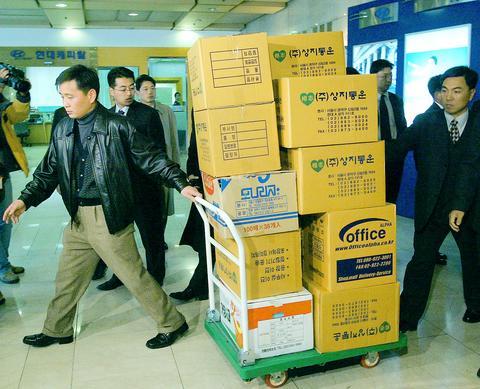South Korea's mounting crisis over a political funding scandal took a bizarre turn yesterday when a pro-government politician said he was on hunger strike to protest against the opposition party chief's own fast.
The head of South Korea's main opposition Grand National Party, Choe Byung-yol, stopped eating on Wednesday, saying he would start again only if President Roh Moo-hyun lifted a veto on parliament's bid to name a special investigative counsel.

PHOTO: REUTERS
The president argues that more time is needed for a separate prosecution inquiry that began as a probe into some of his aides, but then widened to take in big "chaebol" conglomerates and opposition parties just months before April parliamentary elections. Roh has vowed to cut ties between politics and the chaebol.
Now the chairman of the labor committee at the Uri Party, which split from the then-ruling party in September and backs Roh, has stopped eating to highlight what he sees as the disruptive nature of the opposition protest.
"If Choe thought about the future of South Korea and the people, he should stop and return to the National Assembly," said Kim Young-dae by telephone, referring to the opposition-dominated parliament that still has 1,205 bills to vote on before this year's session ends on Dec. 9.
"My hunger protest against Choe will last one day more than Choe's," said Kim. Both men are drinking water but not eating.
South Korean politics is often tempestuous. Labor-related protests can turn violent, providing graphic images that deter potential foreign investors.
The opposition boycott of parliament could hold up voting on next year's budget for Asia's fourth-largest economy. Political tensions also do little to help the North Korea nuclear crisis.
The presidential Blue House had no comment on the hunger strikes. It said an opposition call for prosecutors to probe Roh over bribery allegations was a matter for the prosecutors.
Roh said on Wednesday he would not duck an investigation or interfere with prosecutors already probing a number of his aides.
"We have to follow democratic rules which are written in the constitution before blaming and fighting each other," he said.
A close Roh aide is under investigation for taking 1.1 billion won (US$915,000) from the scandal-tainted SK Group.
Prosecutors investigating fund-raising practices during last year's December presidential election, in which Roh narrowly upset a conservative candidate, have raided units of South Korea's two largest chaebol, Samsung Group and LG Group.
Prosecutors yesterday searched the offices of unlisted Hyundai Capital, a leasing and lending arm of the country's top carmaker, Hyundai Motor. Hyundai Capital's chairman said the raid was linked to the political probe, local media reported.
In mid-October, Roh called for a referendum on his rule and ordered the inquiry. A Blue House official said it would be hard to stick to the mooted Dec. 15 vote because of political developments.
"It looks like the vote will be delayed until the prosecution investigation into the funding scandal is over," he said.
The constitutional court said on Thursday it had narrowly rejected a complaint about the referendum from a former parliamentary speaker and civic groups.
In a further twist, prosecutors said Lee Sang-ho, a brother-in-law of ex-president Kim Dae-jung, had been arrested on charges of accepting 100 million won from a Buddhist temple in return for a promise to secure renovation subsidies.

Yemen’s separatist leader has vowed to keep working for an independent state in the country’s south, in his first social media post since he disappeared earlier this month after his group briefly seized swathes of territory. Aidarous al-Zubaidi’s United Arab Emirates (UAE)-backed Southern Transitional Council (STC) forces last month captured two Yemeni provinces in an offensive that was rolled back by Saudi strikes and Riyadh’s allied forces on the ground. Al-Zubaidi then disappeared after he failed to board a flight to Riyadh for talks earlier this month, with Saudi Arabia accusing him of fleeing to Abu Dhabi, while supporters insisted he was

‘SHOCK TACTIC’: The dismissal of Yang mirrors past cases such as Jang Song-thaek, Kim’s uncle, who was executed after being accused of plotting to overthrow his nephew North Korean leader Kim Jong-un has fired his vice premier, compared him to a goat and railed against “incompetent” officials, state media reported yesterday, in a rare and very public broadside against apparatchiks at the opening of a critical factory. Vice Premier Yang Sung-ho was sacked “on the spot,” the state-run Korean Central News Agency said, in a speech in which Kim attacked “irresponsible, rude and incompetent leading officials.” “Please, comrade vice premier, resign by yourself when you can do it on your own before it is too late,” Kim reportedly said. “He is ineligible for an important duty. Put simply, it was

The Chinese Embassy in Manila yesterday said it has filed a diplomatic protest against a Philippine Coast Guard spokesman over a social media post that included cartoonish images of Chinese President Xi Jinping (習近平). Philippine Coast Guard spokesman Jay Tarriela and an embassy official had been trading barbs since last week over issues concerning the disputed South China Sea. The crucial waterway, which Beijing claims historic rights to despite an international ruling that its assertion has no legal basis, has been the site of repeated clashes between Chinese and Philippine vessels. Tarriela’s Facebook post on Wednesday included a photo of him giving a

Syrian President Ahmed al-Sharaa on Sunday announced a deal with the chief of Kurdish-led forces that includes a ceasefire, after government troops advanced across Kurdish-held areas of the country’s north and east. Syrian Kurdish leader Mazloum Abdi said he had agreed to the deal to avoid a broader war. He made the decision after deadly clashes in the Syrian city of Raqa on Sunday between Kurdish-led forces and local fighters loyal to Damascus, and fighting this month between the Kurds and government forces. The agreement would also see the Kurdish administration and forces integrate into the state after months of stalled negotiations on